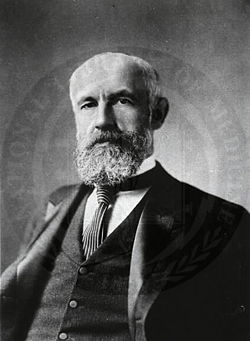Encyclopedia, Difference between revisions of "G. Stanley Hall" - New World
m |
m ({{Contracted}}) |
||
| Line 2: | Line 2: | ||
[[Category:Psychology]] | [[Category:Psychology]] | ||
[[Category:Biography]] | [[Category:Biography]] | ||
| − | + | {{Contracted}} | |
{{epname}} | {{epname}} | ||
Revision as of 15:07, 11 January 2007
Granville Stanley Hall (February 1, 1844 - April 24, 1924) was a psychologist and educator who pioneered American psychology. His interests focused on childhood development and evolutionary theory. Hall was the first president of the American Psychological Association and the first president of Clark University.
Born in Ashfield, Massachusetts, Hall graduated from Williams College in 1867, then studied at the Union Theological Seminary. Inspired by Wilhelm Wundt's Principles of Physiological Psychology, he earned his doctorate in psychology under William James at Harvard University, after which he spent time at Wundt's Leipzig laboratory.
He began his career by teaching English and philosophy at Antioch College in Ohio. In 1882 (until 1888), he was appointed as a Professor of Psychology and Pedagogics at Johns Hopkins University, and began what is considered to be the first American psychology laboratory [1]. There, Hall objected vehemently to the emphasis on teaching traditional subjects, e.g., Latin, mathematics, science and history, in high school, arguing instead that high school should focus more on the education of adolescents than on preparing students for college.
In 1887, he founded the American Journal of Psychology and in 1892 was appointed as the first president of the American Psychological Association, a postion he held until his death[1]. In 1899, he was named the first President of Clark University, a post he filled until 1920. During his 31 years as President, Hall remained intellectually active. He was instrumental in the development of educational psychology, and attempted to determine the effect adolescence has on education. He was also responsible for inviting Sigmund Freud and Carl Jung to visit and deliver lectures in 1909.
Darwin's Theory of Evolution and Ernst Haeckel's Theory of recapitulation were large influences on Hall's career. These ideas prompted Hall to examine aspects of childhood development in order to learn about the inheritance of behavior. The subjective character of these studies made their validation impossible. His work also delved into controversial portrayals of the differences between women and men, as well as the concept of racial eugenics[1].
Hall coined the phrase "Storm and Stress" with reference to adolescence, taken from the German Sturm und Drang-movement. Its three key aspects are: conflict with parents, mood disruptions, and risky behavior. As was later the case with the work of Lev Vygotsky and Jean Piaget, public interest in this phrase and Hall's originating role, faded. Recent research has led to some reconsideration of the phrase and its denotation. In its three aspects, recent evidence supports storm-and-stress, but modified to take into account individual differences and cultural variations. Currently, pyschologists do not accept storm-and-stress as universal, but do acknowledge the possibility in brief passing. Not all adolescents experience storm-and-stress, but storm-and-stress is more likely during adolescence than at other ages.
Hall's major books were Adolescence (1904) and Aspects of Child Life and Education (1921).
Hall also coined the technical words describing types of tickling; knismesis or feather-like tickling, and gargalesis for the harder, laughter inducing type.
References and external links
- Works by G. Stanley Hall. Project Gutenberg
- Biography and bibliography in the Virtual Laboratory of the Max Planck Institute for the History of Science
Credits
New World Encyclopedia writers and editors rewrote and completed the Wikipedia article in accordance with New World Encyclopedia standards. This article abides by terms of the Creative Commons CC-by-sa 3.0 License (CC-by-sa), which may be used and disseminated with proper attribution. Credit is due under the terms of this license that can reference both the New World Encyclopedia contributors and the selfless volunteer contributors of the Wikimedia Foundation. To cite this article click here for a list of acceptable citing formats.The history of earlier contributions by wikipedians is accessible to researchers here:
The history of this article since it was imported to New World Encyclopedia:
Note: Some restrictions may apply to use of individual images which are separately licensed.
